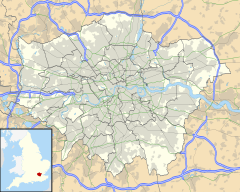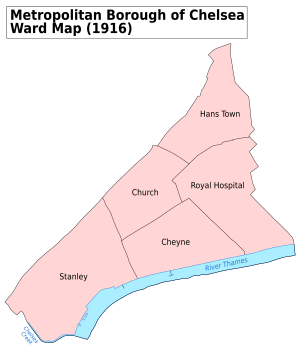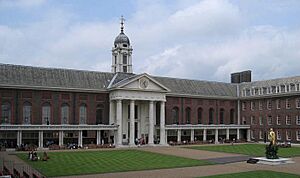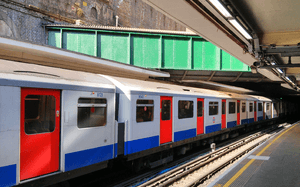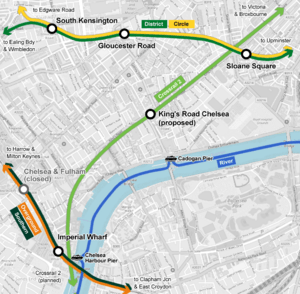Chelsea, London facts for kids
Quick facts for kids Chelsea |
|
|---|---|
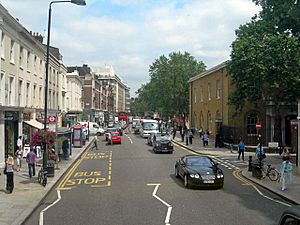 King's Road in late June 2006 |
|
| Population | 41,440 |
| OS grid reference | TQ275775 |
| London borough | |
| Ceremonial county | Greater London |
| Region | |
| Country | England |
| Sovereign state | United Kingdom |
| Post town | LONDON |
| Postcode district | SW1, SW3, SW10 |
| Dialling code | 020 |
| Police | Metropolitan |
| Fire | London |
| Ambulance | London |
| EU Parliament | London |
| UK Parliament |
|
| London Assembly | |
Chelsea is a well-known and wealthy area in West London, England. It is located about 2.5 miles southwest of Charing Cross, a famous central point in London. Chelsea sits on the north bank of the River Thames, which is London's main river. For mail, it is part of the southwest postal area.
Historically, Chelsea was a separate village and parish. In 1900, it became the Metropolitan Borough of Chelsea. Later, in 1965, it joined with Kensington to form the Royal Borough of Kensington and Chelsea. This happened when Greater London was created.
Chelsea is known for its high property prices. This led to the term "Sloane Ranger" in the 1970s. This term described some of the people living in Chelsea and nearby areas. Chelsea is also home to many Americans. In fact, 6.53% of its residents were born in the U.S.
Contents
Discovering Chelsea's Past
How Chelsea Got Its Name
The name Chelsea comes from an old English term. It means "landing place for chalk or limestone" (Cealc-hyð). The first mention of Chelsea as a manor was even before the Domesday Book. This book was a huge survey of England made in 1086. Records show that Thurstan, a governor, gave the land to Westminster Abbey.
Royal Connections in Chelsea
King Henry VIII bought the manor of Chelsea in 1536. You can still find Chelsea Manor Street today. Two of King Henry's wives, Catherine Parr and Anne of Cleves, lived in the Manor House. Princess Elizabeth, who later became Queen Elizabeth I, also lived there. Thomas More lived nearby at Beaufort House.
In 1609, King James I started a college in Chelsea. Later, King Charles II founded the Royal Hospital Chelsea there in 1682. This hospital is still famous today.
By 1694, Chelsea had about 3,000 people. It was a popular place for wealthy families. People even called it "a village of palaces." Chelsea was also a market garden, growing food for London. This continued until the 1800s when London grew bigger.
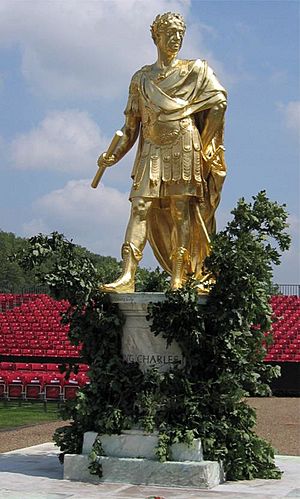
King's Road and Famous Buildings
King's Road is a very important street in Chelsea. It was named after Charles II. It used to be the King's private road from St James's Palace to Fulham. The old Chelsea Town Hall is on King's Road. It's a beautiful building with important paintings inside. Part of it is now the Chelsea Public Library.
Near the library, you can see the old Odeon Cinema. It has a large sculpture of William Friese-Greene. He claimed to have invented early film cameras.
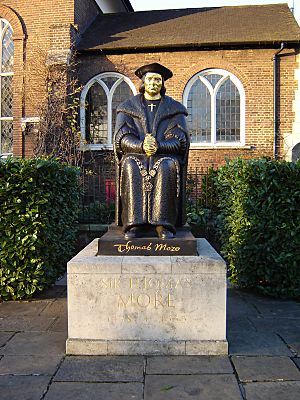
Chelsea used to have different areas. The eastern part, near Sloane Street and the river, was for wealthier homes. The western part was poorer. But this has changed a lot. Now, all parts of Chelsea have very expensive homes.
The churchyard of Chelsea Old Church, near the river, has many old memorials. These tell stories about Chelsea's history. You can find the tomb of Thomas More there.
Chelsea's Sweet and Artistic Side
Chelsea was once famous for its "Chelsea buns." These were sweet, coiled pastries with currants and sugar. The Chelsea Bun House sold them in the 1700s. Even royalty would visit it! On Easter, huge crowds would gather to buy hot cross buns.
The area was also known for "Chelsea China." This was a special type of porcelain. The Chelsea porcelain factory was one of the first to make porcelain in England. Today, original Chelsea ware is very valuable.
The most famous building is the Royal Hospital Chelsea. It was built for old soldiers by Charles II. The building was designed by Christopher Wren and opened in 1694. The famous Chelsea Flower Show is held in its large grounds every year.
Chelsea became known for new ideas and art in the 1800s. Many artists lived and worked there. Later, in the 1960s, it was a key part of "Swinging London."
The Borough of Artists
Chelsea was once known as a "bohemian" place. This means it was a home for artists, writers, and creative people. Today, it's mostly wealthy homes. But the Chelsea Arts Club is still there. The Chelsea College of Art and Design moved from Chelsea in 2005.
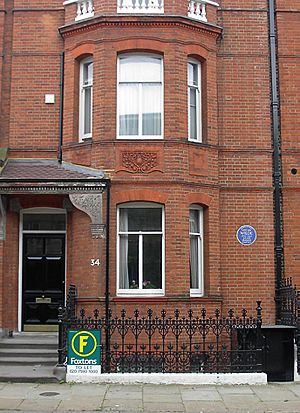
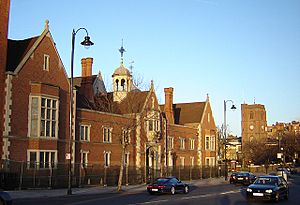
Many famous painters lived and worked in Chelsea in the 1800s. These included Dante Gabriel Rossetti, J. M. W. Turner, and John Singer Sargent. They often lived near Cheyne Walk and Cheyne Row. This area was important for the Pre-Raphaelite brotherhood art movement.
Writers like George Meredith and Thomas Carlyle also lived in Chelsea. Carlyle lived at No. 5 Cheyne Row for 47 years. After he died, his house became a museum. The Chelsea Collection is a valuable group of old prints and pictures of Chelsea. It started in 1887 and has works by famous artists.
The Chelsea Society was formed in 1927. It works to protect Chelsea's buildings and environment.
Swinging Chelsea Today
Chelsea was very important during the "Swinging London" period in the 1960s. King's Road was the heart of this movement. It had many trendy shops and boutiques. Famous people like Keith Richards and Twiggy were customers.
The Beatles and members of The Rolling Stones like Mick Jagger lived in Chelsea. In the 1970s, the World's End area of King's Road was home to Malcolm McLaren, who helped create punk fashion.
By the late 1970s, many artists and punks moved away from Chelsea. They went to places like Notting Hill and Camden Town. This was because Chelsea became more expensive.
King's Road is still a busy street and a shopping area. You can find many well-known shops there. Sloane Street is also a top shopping spot in London. It has many luxury fashion and jewelry stores like Cartier, Tiffany & Co., and Gucci.
Chelsea's Location
 |
Kensington | South Kensington | Belgravia |  |
| West Kensington | Pimlico | |||
| Sands End | Battersea | Clapham |
Sports in Chelsea
In the 1700s, the Chelsea Cricket Club played matches on what was then Chelsea Common. Records show five matches played between 1731 and 1789.
Chelsea Football Club is a very famous team. Its stadium, Stamford Bridge, is in nearby Fulham. It's right next to the border with Chelsea. Because Chelsea is a wealthy area, Chelsea F.C. has some of the richest local supporters in England.
Getting Around Chelsea
Buses
Many Transport for London bus services run through Chelsea.
Tube and Rail
Chelsea itself does not have an Underground (Tube) station. However, two stations are very close: Sloane Square to the east and Gloucester Road to the north. Both are on the District line and Circle line.
To the west, you can find the Imperial Wharf station. This is a London Overground station on the West London Line.
There used to be a Chelsea railway station on this line. It closed in 1940 after being damaged during the Blitz in World War II.
There is a plan to build a new Chelsea tube station on King's Road. This would be part of the Crossrail 2 project. This project has not been approved or funded yet. Plans from 2008 suggested the station would be at Dovehouse Green. However, in late 2020, the government put these plans on hold.
See also
 In Spanish: Chelsea (Londres) para niños
In Spanish: Chelsea (Londres) para niños
 | Stephanie Wilson |
 | Charles Bolden |
 | Ronald McNair |
 | Frederick D. Gregory |


